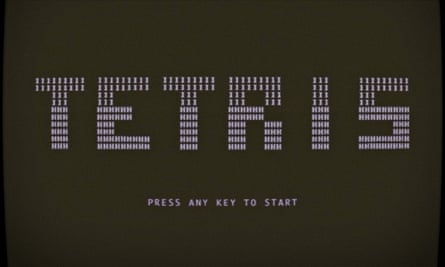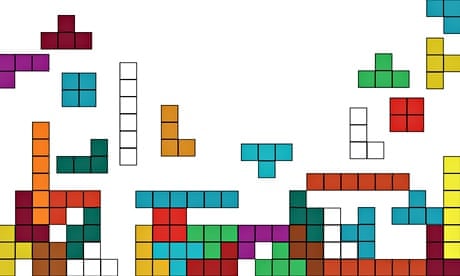Alexey Pajitnov, programmer
In the early 80s, I worked at the computing lab for the Academy of Science of the USSR, researching artificial intelligence. It was one of the very few Soviet institutes able to communicate with the rest of the world, so people occasionally sent us new hardware. We'd assess how powerful it was by writing a simple program for it, which became my excuse for making games.
I've loved puzzles ever since I was a child, especially pentominoes. You could get three of these geometric games for a rouble in Moscow toyshops. In June 1984, it occurred to me that they might be a good basis for a computer game. But having the 12 pentomino pieces rotating in real time seemed too complicated, so I scaled it down to tetrominoes, of which there are seven. Also, the Electronika 60, the Russian computer I originally wrote Tetris for, didn't have proper graphics, just a monitor that could display text, so I used letters to form the playing pieces.
Next I put together the procedures for manipulating the pieces: pick a tile, flip it, rotate it. But the playfield filled up in 20 seconds flat. Also, once you'd filled a line, it was kind of dead, so why keep it on the screen? So I made each full line disappear, which was key. I was a pretty good programmer and it took me about three weeks to get something controllable on screen. I pretended I was debugging my program, but in truth I just couldn't stop playing it. When other people tried it, they couldn't, either. It was so abstract – that was its great quality. It appealed to everybody.
I had no idea how to publish it. I suspected that trying to would get me into trouble, but the PC version had been smuggled to Hungary and western companies started producing unauthorised versions. Perestroika had started, so I granted my rights to the government for 10 years. It was among the first pieces of software exported by the Soviet Union.
Spectrum HoloByte, the US company who produced one of the earlier versions, had a big influence on how it was marketed. I found all those matryoshka dolls and churches a bit tacky, but they helped sales. They chose Korobeiniki, a 19th-century Russian folk song, for the music; and Nintendo later included Tchaikovsky's Nutcracker theme. It was very embarrassing for me: when kids of the world hear these pieces of music, they start screaming: "Tetris! Tetris!" That's not very good for Russian culture.
I didn't make much money at first, but I was happy, because my main priority was to see people enjoying my game. Tetris came along early and had a very important role in breaking down ordinary people's inhibitions in front of computers, which were scary objects to non-professionals used to pen and paper. But the fact that something so simple and beautiful could appear on screen destroyed that barrier.

Henk Rogers, videogame licenser
My job in the 80s was acquiring games for the Japanese market. When I first came across Tetris in January 1988, at the Consumer Electronics Show in Las Vegas, I was hooked instantly, which was unusual. I licensed every version on every system I could through Spectrum HoloByte. But it turned out their parent company, Mirrorsoft [owned by Robert Maxwell], had already given some of the Japanese rights I thought I owned to Atari.
It was a total mess, so when it came to securing the Game Boy rights, I went straight to Moscow to speak to Elorg, the bureau handling the export of software. I didn't know anyone in the capital, or where the ministry was. The Muscovites were completely unfriendly: nobody spoke English, and they weren't allowed to talk to me anyway.
I'd planned to get a fur coat when I arrived, but I found it impossible to buy anything, so I was freezing my ass off. I play the board game Go, so I tried to find a local Go association, thinking I could make a friend. I ended up playing the third strongest player in the Soviet Union – and I beat him. But he spoke no English.
Finally, I hired an interpreter from a booth in the lobby of my hotel. They were all KGB, but she was beautiful and very perky, when everybody else was doom and gloom. She took me to Elorg, but she wouldn't take me in because I hadn't been officially invited. I was breaking a cardinal rule – trying to do business on a tourist visa – but I told her I hadn't come all this way for nothing. It was like standing on a rock 50ft above water. You just have to jump and trust it's not going to be as bad as you think.
The director of Elorg, a Mr Belikov, told me they had never given rights to anybody. I was in deep kimchi, because I had 200,000 game cartridges at $10 apiece being manufactured in Japan, and I'd put up all of my in-laws' property up as collateral. We reconvened the following day and they had a lineup of 10 people – KGB, business guys, lawyers, Alexey – who grilled me for two hours. I didn't realise at first, but they were negotiating simultaneously with Kevin Maxwell.
The KGB even sent two agents to my office in Tokyo. Because I'd had no contact with my staff, they thought: "Oh my God, what's happened to Henk?" But I was very open with the Russians and they decided to give me console rights. I gave them the best contract I've ever seen in the industry – clear, concise, no bullshit – partly because there wasn't time for any renegotiations. Elorg used it as the template for all their other deals. The Maxwells were furious, and tried to lobby Gorbachev, whose autobiography they'd published.
Tetris made Game Boy and Game Boy made Tetris. It was the perfect platform for the game, since you could carry it around. That's how it caught on. And it's even bigger on mobiles.

Comments (…)
Sign in or create your Guardian account to join the discussion